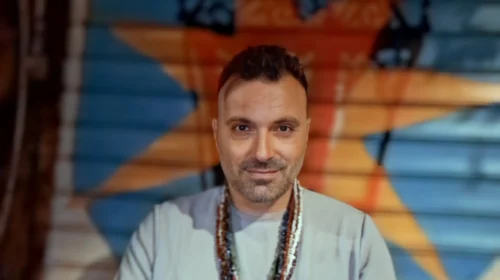Singer/songwriter Stefanie Joyce releases her daring and bold Marlboro Reds & Motel Rooms EP, now available on all digital streaming platforms. She follows the EP release with music video for single “Tulsa.”
Stefanie Joyce’s music video for single “Tulsa” helps to complete the full aesthetic that Joyce has brought to this project: dark, gritty, and raw. The EP maintains gorgeous melodies and deep lyrical themes throughout, while holding together the dark aura of the album as a whole.
You can learn more about the EP below:
Marlboro Reds & Motel Rooms crafts an engaging and clever narrative about what it means to love, lose, and move on, as well as the fallibility of humans. It’s wise and a testament to her love of storytelling and the southern tradition.
The first track, “Presidio,” is a meditative and soothing stage-setter for the rest of the EP. Joyce sings of longing to go back to Presidio and the long-gone time where she was still in the relationship she’s singing about. It’s moving and vulnerable, and definitely relatable for anyone who knows what it’s like to let fear take over, barring you from taking that next step in a relationship.
The third track, “Tulsa,” brings another location into the mix as Joyce sings about endings: that last cigarette, that last drink, that last love. The EP’s title is derived from the opening lines of this track: “I used to like Oklahoma/Marlboro Reds and motel rooms/I used to like bourbon in my cherry cola/I liked a lot of things when I loved you.” Joyce sings of a hard truth in this song, that you “can’t have something just because you want it.” It’s about letting go, recognizing the importance of the past and moving on, and that message is powerful.
The EP’s penultimate track, “Love Thy Neighbor,” puts a clever spin on the Christian phrase by making it about having an affair with the narrator’s neighbor. As Joyce says, “It’s so hard to give up something that’s so easy to get.” Everyone’s got a secret, it’s just a matter of it coming out or not. Joyce spins a cheeky narrative around this concept, with the narrator claiming she tries “to be a damn good wife,” so why does it matter if she cheats on her husband? It’s an interesting take on the double standard people take with women who are unfaithful, especially since it spins a religious phrase.
The final track of this EP, “Ticket to Atlanta,” is a wistful bookend to the whole project, with soft vocals and a gentle instrumental. It’s about leaving your mistakes behind, quietly and without a trace, refusing to confront them and instead moving on. Except, not really. Sometimes we can’t help but give in to the impulse to run away, and feel as though we’re finally going to go through with it. But we don’t; we stay, and we “tear up that ticket,” as Joyce puts it, and we go back. Some decisions are too hard to make, and running away isn’t always where the heart’s at.














